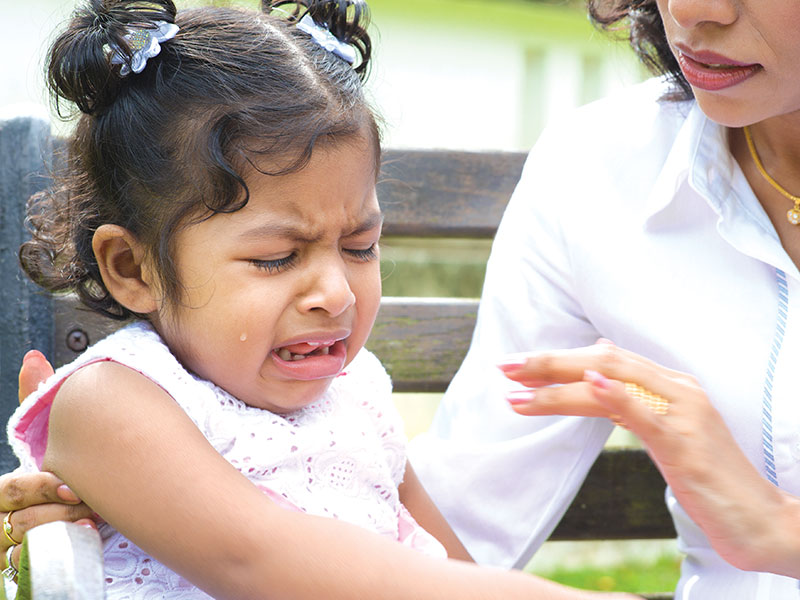
 – Cathrine Neilsen-Hewett is an associate professor in early childhood education, Early Start and School of Education, University of Wollongong and Steven Howard is an associate professor, child development, University of Wollongong. (This article is republished from The Conversation under a Creative Commons license)
– Cathrine Neilsen-Hewett is an associate professor in early childhood education, Early Start and School of Education, University of Wollongong and Steven Howard is an associate professor, child development, University of Wollongong. (This article is republished from The Conversation under a Creative Commons license)
With governments around the world asking their citizens to avoid places, activities and gatherings to save lives, this just might be the largest ever international effort to self-regulate our actions against competing desires and impulses.
 To achieve this, we must overcome our desire to enjoy the sun and sand, go shopping or to the pub, and even embrace family and friends.
To achieve this, we must overcome our desire to enjoy the sun and sand, go shopping or to the pub, and even embrace family and friends.
Of course, it’s not so easy for young children, who must forego activities they previously enjoyed and may be confused by contradictions — like being able to see friends at, but not after, school.
But there are ways parents can help children learn to regulate their emotions and behaviour, and to practise these skills.
Why do kids need to learn to self-regulate?
Self-regulation has always played an important role in our lives. It’s what underpins our ability to control our behaviour, emotions and interactions, while at the same time avoiding distractions and enticing alternatives. With lower levels of self-regulation, our decisions and behaviour would more frequently be poorly conceived, unnecessarily risky or inappropriate to the situation — often with undesirable results.
Even in the early years of life, the ability to self-regulate is important. Preschool children who have better self-regulation are often better prepared for school and life.
They tend to:
- have higher levels of academic success
- make fewer risky decisions as adolescents
- and enjoy better health, wealth and productivity as adults.
So, what can we do to support children’s self-regulation, especially during this pandemic, when their capacity for self-control already appears to be under strain?
Self-regulation requires at least three things: setting goals, problem-solving and working on motivation, and overcoming distraction and impulses.
1. Selecting goals
Self-regulatory behaviour is goals-directed. This means children themselves must decide to behave in a particular way.
If a child is unaware of (or forgets) a family tradition of waiting for everyone to be seated before starting to eat, she would be providing proof of poor self-regulation. Yet perhaps this child never decided to pursue that goal in the first place.
We need to support children’s thinking and decision-making towards attaining goals, while acknowledging that goals can change and plans may need to be adjusted.
Adults can support children to become goal-oriented by giving them opportunities to lead and make decisions, as well as encouraging them to devise simple plans, strategies and procedures to achieve set goals.
This may be as simple as asking children to decide what they would like to play (building a cubby house), and plan where they would play (bedroom), with whom (mum, dad, sibling), and what resources they will need (cardboard box, cushions).
 2. Problem-solving and motivation
2. Problem-solving and motivation
Even when a goal has been set, the path to realising it is seldom smooth. Children are likely to encounter distractions and competing opportunities along the way. So they need to devise effective problem-solving and motivation strategies.
To be effective problem-solvers, children must be taught that there are several paths to achieving their goals. This requires developing creative and critical-thinking skills.
As adults, we can encourage children to:
- engage in brainstorming activities. Perhaps finding an alternate ending to a familiar story, such as Peter Pan losing his shadow
- asking open-ended questions and posing small problems — as in “How might we capture our shadow? What will we need?”
- encouraging reflective thinking, such as “I wonder, why don’t we see shadows on the ground at night?
Supporting young children to persevere when confronted with challenges requires taking cues from your child, validating her efforts, reinforcing her solutions and encouraging a search for alternatives.
3. Overcoming distractions and impulses
Children need to be taught how to overcome distractions and impulses that may impede them from achieving their goals.
As with most endeavours, this self-regulatory capability can be developed by practice. This can be achieved in simple, playful ways.
A game, played around the world, is musical statues. Children dance while the music plays and freeze when it stops.
What often happens in this game, though, is children who can’t or don’t freeze are either left to continue dancing or they are “out”. Those who perhaps would benefit most from the playing get the least opportunity to practice.
Instead, if a child doesn’t freeze in time, have them removing their legs from the equation in the next round, sitting on their bottoms. As they succeed, they can return to standing.
When children can play statue well, why not reverse things so you dance when the music is off and remain still while the music plays?
This gives children practice of controlling impulses — in this case, to keep dancing when the rule requires them to stop — at an achievable level of challenge.
For parents, it gives them unique insight into children’s capacity to control their behaviour, and where they may require additional support.
What else do you need to take into account?
Things like stress, tiredness, hunger, fear, sadness and loneliness can deplete children’s limited self-regulation resources. Parents should strive to mitigate the impact of these factors before trying to extend children’s self-regulation further.
In the current climate, we can ensure children are operating at their self-regulatory best when we reduce unnecessary demands, ensure routines are not overloaded, and parents are patient and realistic when setting goals.
Lastly, whether we are aware of it or not, children often model themselves on the ways we act and respond. As adults, it’s important to reflect on our own behaviour: Do we give up when challenged, yell when frustrated, fight for resources, or give preference to others in need over our own wants?
How we respond to this ‘new normal’ will set an example for the youngest generation — and they will undoubtedly learn from our responses.
Also read: How to keep children positive during the pandemic?

























